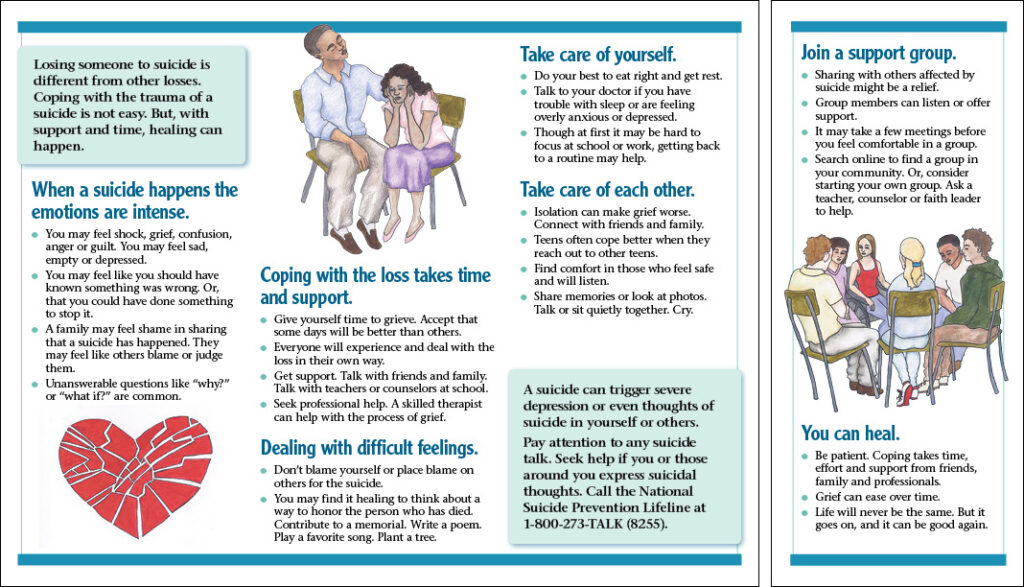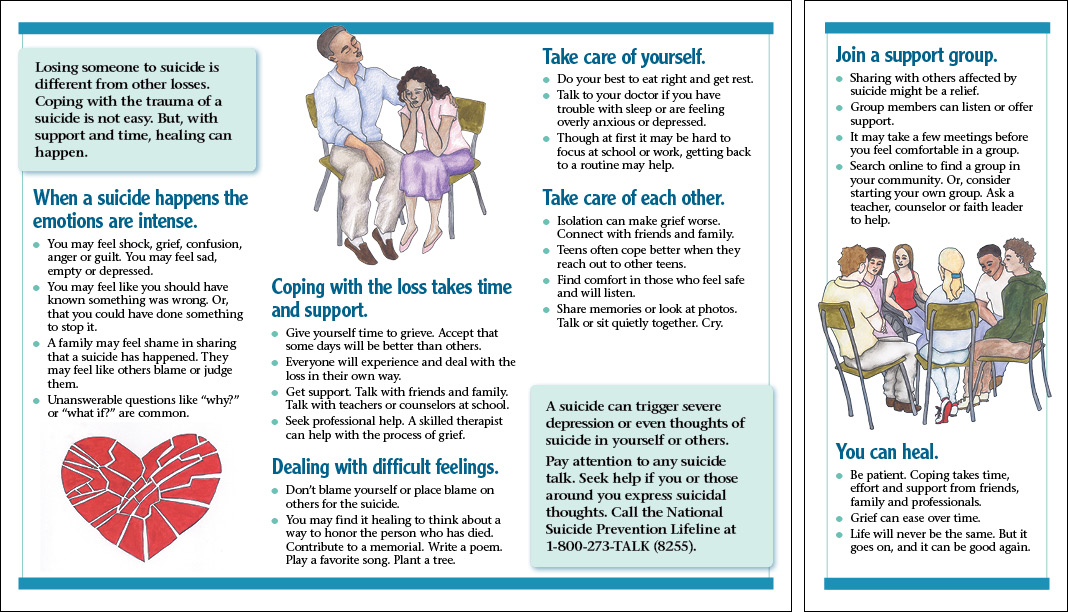
Coping With a Suicide: Navigating Grief and Finding Support
The aftermath of a suicide is devastating. The raw grief, the unanswered questions, and the lingering sense of disbelief can feel overwhelming. Learning how to cope with a suicide loss is a journey, not a destination. It requires time, patience, and a willingness to seek support. This article aims to provide guidance and resources for those navigating this incredibly difficult experience. It is crucial to remember that you are not alone, and help is available.
Understanding the Unique Challenges of Suicide Loss
Grief following a suicide differs significantly from grief after other types of death. The suddenness and the often-unexplained nature of suicide can lead to intense feelings of guilt, anger, shame, and confusion. Survivors may grapple with questions like “Why?” “What could I have done differently?” and “Did I miss the signs?” These questions can be relentless and contribute to prolonged grief. The stigma surrounding suicide can also isolate survivors, making it harder to seek and receive support.
The Role of Guilt and Self-Blame
Guilt is a common emotion after a suicide. Survivors may replay past conversations and interactions, searching for clues or moments where they could have intervened. It’s important to recognize that you are not responsible for another person’s actions. Suicide is a complex issue with multiple contributing factors, and placing blame on yourself is not only unfair but also hinders the healing process. Acknowledging and challenging these feelings of guilt is a crucial step in coping with a suicide.
Dealing with Anger and Resentment
Anger is another prevalent emotion. Survivors may feel angry at the person who died, at themselves, at the situation, or even at the world. This anger can manifest in various ways, such as irritability, frustration, or outbursts. It’s essential to find healthy ways to express and process this anger. This might involve talking to a therapist, writing in a journal, or engaging in physical activity. Suppressing anger can be detrimental to your mental health and well-being after coping with a suicide.
Confronting Stigma and Shame
The stigma associated with suicide can prevent survivors from seeking support and openly grieving. Shame and embarrassment can lead to isolation and a reluctance to talk about the loss. It’s important to remember that suicide is a public health issue, not a moral failing. Seeking professional help and connecting with support groups can help break down the stigma and provide a safe space to share your experiences. Understanding this is crucial when coping with a suicide.
Practical Strategies for Coping with a Suicide
While there is no one-size-fits-all approach to grief, several strategies can help you navigate the healing process after a suicide. These strategies focus on self-care, seeking support, and honoring the memory of the person who died.
Allow Yourself to Grieve
Grief is a natural response to loss, and it’s essential to allow yourself to feel the emotions that arise. Don’t try to suppress or ignore your feelings. Allow yourself to cry, to be sad, and to experience the full range of emotions that come with grief. There is no right or wrong way to grieve, and everyone processes loss differently. Be patient with yourself and allow yourself the time you need to heal. Acknowledging your feelings is fundamental when coping with a suicide.
Seek Professional Help
Therapy can provide a safe and supportive space to process your grief and develop coping mechanisms. A therapist specializing in grief and trauma can help you understand your emotions, challenge negative thoughts, and develop strategies for managing your grief. Cognitive Behavioral Therapy (CBT) and Eye Movement Desensitization and Reprocessing (EMDR) are two therapeutic approaches that can be particularly helpful for survivors of suicide loss. [See also: Finding a Therapist After Loss]
Join a Support Group
Connecting with others who have experienced similar losses can be incredibly beneficial. Support groups provide a sense of community and understanding. Sharing your experiences and hearing from others who have gone through similar situations can help you feel less alone and more supported. Support groups also offer practical advice and coping strategies. Several organizations offer in-person and online support groups for suicide loss survivors. Finding a community is a great way of coping with a suicide.
Practice Self-Care
Taking care of your physical and emotional well-being is crucial during the grieving process. This includes getting enough sleep, eating nutritious meals, exercising regularly, and engaging in activities that bring you joy. Avoid using alcohol or drugs to cope with your grief, as these substances can exacerbate your emotions and hinder the healing process. Prioritizing self-care is not selfish; it’s essential for your overall well-being. Remember to be kind to yourself while coping with a suicide.
Establish a Routine
Grief can disrupt your daily routine and make it difficult to focus on everyday tasks. Establishing a routine can provide a sense of structure and normalcy during a chaotic time. This might involve setting specific times for meals, exercise, and sleep. Breaking down larger tasks into smaller, more manageable steps can also make them less overwhelming. Even small routines can bring comfort while coping with a suicide.
Limit Exposure to Triggers
Certain triggers, such as news reports about suicide or social media posts, can evoke painful memories and emotions. It’s important to be mindful of these triggers and limit your exposure to them. Unfollow or mute accounts that are triggering, and avoid watching or reading news stories about suicide if they are upsetting. Protecting your mental health is essential during the grieving process. Minimizing triggers is vital while coping with a suicide.
Honor the Memory of the Person Who Died
Finding ways to honor the memory of the person who died can be a meaningful way to cope with your grief. This might involve creating a memorial, sharing stories about them, or participating in activities they enjoyed. You could also volunteer for a cause they were passionate about or create a scholarship in their name. Honoring their memory can help you keep their spirit alive and find a sense of purpose in your grief. Remembering the good times can aid in coping with a suicide.
Be Patient with Yourself
Grief is a process, not an event. There will be good days and bad days. There will be times when you feel like you’re making progress, and times when you feel like you’re back at square one. Be patient with yourself and allow yourself the time you need to heal. Don’t compare your grief to others, and don’t expect yourself to be “over it” within a certain timeframe. Healing takes time, and it’s okay to not be okay. This journey of coping with a suicide requires immense patience.
Resources for Suicide Loss Survivors
Numerous organizations and resources are available to support suicide loss survivors. These resources offer information, support groups, and crisis intervention services.
- The American Foundation for Suicide Prevention (AFSP): Provides information, resources, and support groups for suicide loss survivors.
- The Suicide Prevention Lifeline: Offers 24/7 confidential support for people in distress. Call or text 988.
- The National Alliance on Mental Illness (NAMI): Provides education, support, and advocacy for people with mental illness and their families.
- The Dougy Center: Provides support groups and resources for children, teens, and families grieving a death.
- Survivors of Suicide Loss (SOSL): Offers peer support groups and resources for suicide loss survivors.
The Importance of Seeking Help
Coping with a suicide is incredibly challenging, and it’s important to remember that you don’t have to go through it alone. Seeking professional help and connecting with support groups can provide you with the tools and resources you need to navigate your grief and find healing. If you are struggling to cope, please reach out for help. Your mental health is important, and there are people who care about you and want to support you. Remember, seeking help is a sign of strength, not weakness. This is crucial when coping with a suicide.
The journey of coping with a suicide is a long and arduous one. There will be moments of profound sadness, overwhelming anger, and crippling grief. But there will also be moments of resilience, hope, and healing. By allowing yourself to grieve, seeking support, and practicing self-care, you can navigate this difficult experience and find a path towards healing and recovery. Remember that you are not alone, and help is always available. Understanding the process of coping with a suicide is the first step toward healing.

